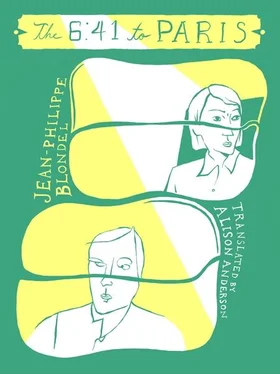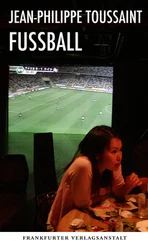“Coffee?”
“No … I think … I don’t think that’s a good idea.”
“What makes you so sure?”
“I’m not. I’m not so sure. It’s just that this sort of thing happens all the time, people who knew each other briefly a long time ago and they run into each other, and there’s nothing more to say, you think about it for a few minutes and then you go back to your routine, there’s no reason why you should change it.”
“You basically go on taking care of things.”
“Yes, that’s it.”
“I hope you’ll have a thought for me before you die.”
Cécile Duffaut is shocked. Almost as much by the words as by the general appearance of the man standing across from her. He seems to be projecting a sort of violence she would never have imagined. Violence but also, oh God, she doesn’t want to admit it, but yes, all the same, never mind if it seems hackneyed, yes, he’s projecting sensuality, the sensuality of 8:15 in the morning, on the platform at the Gare de l’Est, it’s hardly the place for it, after all. There he is, he’s desperate, like a dog about to bite, she has to leave now, she’s right, she knows she is, she has to go. Her brain is teeming with words, snatches of phrases, fragments of images, if she were Valentine, she’d give him her email, digital makes things easier, it leaves a trace and yet at the same time leaves no trace, it’s magical, but now is not the time for magical thinking, get going now, move.
She picks up her bag. She shifts her shoulder so it will hang properly, she smoothes her skirt which had ridden up slightly, she’s not looking at him anymore, she turns around and heads for the exit, she’s searching for something to say, she ought to be able to come up with some ironic quip about fate, misfortune, destiny, something that would hit home, but she can’t find anything, it’s hopeless, she keeps walking, there’s nothing left, it’s incredible how there’s nothing left, it’s a desert, a green desert, the Périgord, the Lot, rocks, oak trees, walnut trees, a river, a river through the Gare de l’Est, what on earth, railway tracks, there’s nothing but railway tracks and the imperturbable voice announcing platforms, arrivals, departures, delays, because oh yes, there are plenty of delays, and sometimes the trains stop altogether, somewhere they are not taking care to keep things going, and that’s not good, not to take care, not good at all.
Then, ever so slowly, she stops. She is next to car number three. She doesn’t turn around. Seen from behind — her shoulders drooping only slightly, her handbag swinging dangerously, her fingers relaxing, she has paused to take a deep breath. Her legs don’t move. She is still facing toward the central hall of the station, and there are hundreds of thighs, elbows, bellies, feet, and hips hurrying past her. She has stopped. She’s not taking care. She is going to turn around. No one knows if it will be a good thing.












